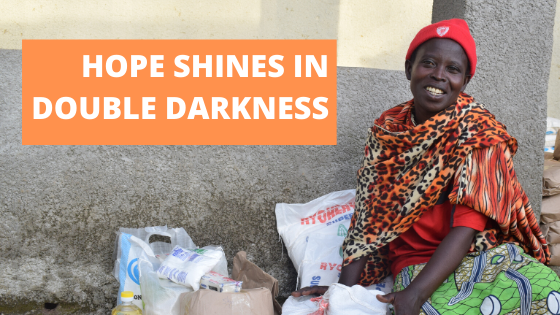HOPE Shines in Double Darkness
- Karen Visser
- Apr 24, 2020
- 3 min read
Updated: Apr 26, 2020
It’s pretty tough to find a way to say ‘thank you’ that truly expresses to you the depth of our gratitude.
Let’s start by letting you know exactly what you’ve achieved so far:

I’m speechless. Presents a bit of a problem when you write the communications! But honestly, this is AMAZING and there just aren’t words to express what this means to families and the hope it has brought.
But there’s something else to share, another aspect to this story that will blow you away even more.
I’m not sure where you are reading this, and what the lockdown experience has been like for you so far. For me personally, April is usually a big month of celebrations in my family – we have five birthdays in my husband’s family, including his! This is an extra special year too, with a milestone birthday for my father-in-law. Thanks to technology, we’re lucky to still have been able to see each other on video, talk and laugh together, share memories and celebrate – but it certainly wasn’t the same and we really felt that lack of physical connection.
It’s hard to be apart from the ones you love during times of celebration and joy – but what’s much harder is being at the other end, separated when you are going through grief and loss. Even some of our own team have experienced the pain of now having to watch a funeral online, and in that seeing those present not be able to comfort each other.
The month of April is the beginning of the memorial period for Rwandans, in which they remember, grieve and acknowledge the killing of over one million people during the 1994 Rwandan Genocide Against the Tutsi. Even before COVID-19, many Rwandans were already living in loneliness and isolation because they lost nearly every member of their family during the genocide – for many, they are the only survivors.
This is an incredibly difficult time, made unimaginably worse this year, because in the midst of their pain and grief, Rwandans cannot gather together in community to remember. They cannot cry together. They cannot hold hands. They cannot hug. They cannot leave their homes, which only increases their trauma as it brings them back to the days of the genocide – when they couldn’t go outside and when the roads were blocked, just like they are now. COVID-19 has brought a time of double darkness to Rwanda as the resulting lockdown increases the trauma, pain and loss of survivors during the hardest time of the year.
Yet in the midst of that darkness, you have shone a bright light of hope. At its most basic, you have provided food to the hungry, a means to survive – which is so wonderful. But you have done so much more than that – during the darkest of days, you have given people value and connection. For each of these 829 people, receiving this food means that somebody knows them, somebody is thinking of them, somebody cares about them – and that message of hope is just as important as the food itself.
One widow, a genocide survivor, shared, “I am so thankful to be able to get some food during this time of
lockdown, but also during the remembrance [genocide memorial period]. I was hopeless and afraid that I may die of hunger and no one will know.”
I think that statement captures the essence of what 21 Days of Hope is about – the suffering of others during this time, because of their context, is so far beyond anything most of us will experience. Through a simple act of generosity and kindness, we can not only share food, but also connection, dignity and value. I honestly don’t think it gets better than that.
If you’ve been a part of this story, we’re sending you a virtual hug or high-five – whatever you’re most comfortable with! If you’re just tuning in, it’s not too late to get on board – we’ve got 10K to go and thousands more people to help – click here to give.
Heartfelt thanks once again from all of us at CBL and from our partner in Rwanda, CARSA – please continue to share the story, and share the hope!












Comments